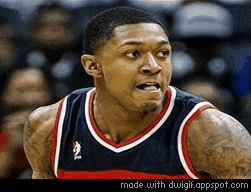payitforward wrote:Ruzious wrote:Durant's one of the all-time greats, and I'm not sure how much better he could possibly get. He's an exception to a lot of rules. And he excelled - even for him - when it mattered the most - in the finals. That's important. He could not do that with OKC.
Zaza hit the age wall and should be declining. Joining GS probably extended his career.
Iggy's usually been playing with the second unit, so he hasn't gotten the full GS effect.
I love Green as a player, and I agree he is part of the reason GS is so good, but he's that much more effective because he's playing for GS, and I do believe his stats would would decline quite a bit if he was on a bad team. He might score more points on a bad team, but his other stats would suffer.
Again, the only *empirical* argument for your position that I can think of would be to find some more or less equivalent situation -- a player who put up outstanding numbers with a terrific team, then was traded to a significantly less good team & had "his stats... decline." An example along those lines would go some way towards establishing your point -- & I'd be interested to think about that situation, too. I imagine there must be a candidate for that scenario.
Otherwise, it's post facto stuff -- like saying that Zaza hit the age wall right on time to make a comparison meaningless between the season he played for Dallas @32 years of age & the one he played @33 years of age for GS. It's a narrative, not an empirical claim.
As to Iggy, my point was that he changed teams, meaning that he started playing with a completely different set of teammates, but his numbers didn't change. I.e., I'm not saying you are incorrect about Golden State; I'm saying that, over any meaningful # of minutes, the numbers a player puts up are a function of his play, not of his teammates.
I don't want to belabor this, & obviously I don't want us to get into some online-style argument with increasing heat. We can drop it if you like. But, in fact, I'd be interested to find an example of the kind you suggest & that I describe above.
This fits the "learning" post I wrote yesterday. To me, the operative method in building a team is simple. It's just the way we've all done it on the playground. Every time you choose up sides, you pick the best players you can! Of course there's a limiting factor, as there is with everything: you can't pick 5 PGs! & you can't pick guys who don't want to play together either.
Overall, however, the algorithm remains -- when it's your turn to pick, grab the best player available. If a player's "goodness" is a function of his teammates, that's impossible.
PIF, I don't think you've said anything new there that helps your argument. We'll have to agree to disagree.

























